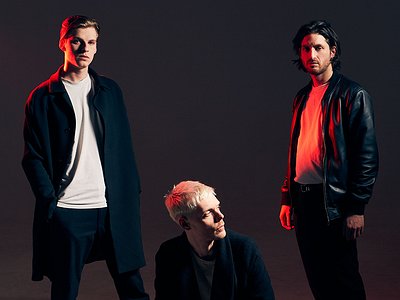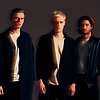Part 2
Collaborations can take on many forms. What role do they play in your approach and what are your preferred ways of engaging with other creatives through, for example, file sharing, jamming or just talking about ideas?
The entire project has been created with collaborations. I met most of the crew I currently work with through collaborations. The first most significant one was with Noah Luttermann, known under the moniker NORR. We produced a Tech House EP on his label LOK Recordings, and from there we started to work together, design Cook Strummer’s live show and release the album on his label. Then there is also Yoann Pistermann, the drummer, with whom I brainstormed mainly about aesthetics, art and music, in order to develop the concept.
The project truly became a 360° platform for everyone involved. The 4th member of the band, Christopher Müller, is a video director. He's been following the project with his camera for the past two years.
Collaborations in general allowed me to grow as a musician. You learn from people, discover new processes and get out of your comfort zone. To my point of view, it is a necessity in order to evolve.
Could you take us through a day in your life, from a possible morning routine through to your work? Do you have a fixed schedule? How do music and other aspects of your life feed back into each other - do you separate them or instead try to make them blend seamlessly?
I wake up and immediately meditate. Then I have an hour of sport and music in order to feel fresh. Then I make a liter of coffee and listen to music. When a vibe emerges and I feel inspired, then I start composing and recording. But I never force myself, and I think that it is the most important.
Sometimes I can be over-productive and record 5 to 8 tracks a day. But I am more and more out of this manic process. It suits some people, but I decided to get out of the “I need to produce everyday” phase. On the other hand, I am able to create more consistent pieces of music. Tracks with a beginning and an end, that don’t need to be touched till the mix. It’s very satisfying.
Could you describe your creative process on the basis of a piece or album that's particularly dear to you, please? Where did the ideas come from, how were they transformed in your mind, what did you start with and how do you refine these beginnings into the finished work of art?
Radiohead’s “In Rainbows” played an important role in the album making. To find orientations regarding the sound textures, the different instruments’ rooms and the effects used. It was probably unconscious, I must admit I realised the influence this album had after the mix.
But all in all the influences came from very diverse types of music.
There are many descriptions of the ideal state of mind for being creative. What is it like for you? What supports this ideal state of mind and what are distractions? Are there strategies to enter into this state more easily?
In order to be creative, I need to feel comfortable in my environment, with the tools I use and of course, I need a dedicated timeframe. My ideal state of mind is optimal after meditation and sport. That’s the reason why I do it everyday. Distractions are mainly socialmMedia and videogames. But after sport, there is no need for those two activities.
How is playing live and writing music in the studio connected? What do you achieve and draw from each experience personally? How do you see the relationship between improvisation and composition in this regard?
A live set needs a lot of care and preparation work. Especially when it comes to translate a solo album with a band. It took us 6 months to put all the stems together and rehearse with synths, drums and guitars in order to be ready for concerts. We played our first show at Berghain Kantine and then KaterBlau with this set.
Right now we feel the need to explore more the improvisation. That’s the reason why we are taking out some samples from the current set, and replacing those with live instruments. It’s a lot of work, especially concerning the volumes and global mix. Ideally we aim for a fully flexible live set. But we are not there yet.
How do you see the relationship between the 'sound' aspects of music and the 'composition' aspects? How do you work with sound and timbre to meet certain production ideas and in which way can certain sounds already take on compositional qualities?
The sound aspects of music have to my point of view more to do with creation and experimentations. The composition is more about putting technical musical pieces of a puzzle together. It can be very nonal. I’ve always considered the sound more intuitive.
I love randomness, off tempo or swing, when the notes are slightly not matching the beat, when the sounds loose themselves into similar frequencies to create a wonderful mess. I love first of all working with real instruments, especially strings, so the intensity on each note is different, and the sound spectrum quite huge. I also work a lot with velocity when it comes to synths and VSTs.
And last but not least, I create the drum parts with the same mindset. So most of the time, even if there is a stable kick base, there is often off tones, off tempos, and swingy snares here and there.
Our sense of hearing shares intriguing connections to other senses. From your experience, what are some of the most inspiring overlaps between different senses - and what do they tell us about the way our senses work? What happens to sound at its outermost borders?
When I listen to music, I make immediate associations to very specific moments of the past. I can almost also get into a dream state sometimes, remembering colours, smells and live the situation again.
Crazy what music can do. Sometimes I even have the feeling of seeing my future. And it is especially the case with my own music. With the particularity that there is a real piece of my soul in each track. For real. Some people record tracks to document stuff. Some to exhibit their techniques or a high skill level. In my case, it’s more about emotions.
Art can be a purpose in its own right, but it can also directly feed back into everyday life, take on a social and political role and lead to more engagement. Can you describe your approach to art and being an artist?
The fascination of art as a dream is not comfortable. You can’t stay still. It always need to move in a direction without knowing what’s next. Being an artist to me was quite complicated at the beginning, because for many creative people, being an artist is experiencing quite young stepping out of the norm and playing by your own rules.
It’s only later that I could find my own spiritual family. Now I’ve been through the teenage crisis, I evolved into a confident catalyst. Catalyst because ideas are in the air. And artists are sensitive enough to make those ideas concrete through their own bones, body and soul. They vibrate and resonate high and loud enough to be shared with passion.
That’s why it is important to fail early, to fail hard so you can renew yourself, and get stronger. And most of all, you learn that you are not alone and surround yourself with like-minded people crazy enough to spread the same fire.
There is a responsibility. A human one.
It is remarkable, in a way, that we have arrived in the 21st century with the basic concept of music still intact. Do you have a vision of music, an idea of what music could be beyond its current form?
I think music is evolving more and more into an experience. I go clubbing in Berlin because I love to meet my tribe, experiment with new sensations. Festivals are even bigger sources of energy.
Those activities are very similar to ancient tribal rituals. You go to a dedicated place in order to perform a ceremony, dressed up depending on the event / club, dance on binary beats and take eventually substances if your mind has issues to open up. Nothing new there. And more and more people don’t focus on drugs anymore. Just the experience. Because it includes all the senses.
At the moment I believe in a true spiritual evolution. Ideas and connections are very fast. Even energy wise. People I tend to meet feel more, connect more and share more about their experiences.
The next step, as I can only predict, is to reach transcendence through music. To travel on different dimension plans. Dimensions are made of layers vibrating and crossing each other (I know i can go far in the spiritual, but this is only quantum physics, and part of string theory).
And why not someday, travel in time with music. Some proper future going on here.






